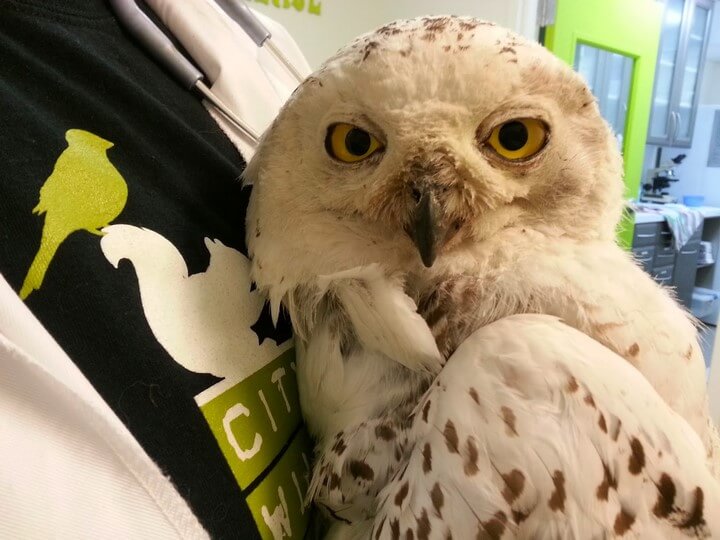Wednesday, June 25, 2014
Amelia's Kittens
Wednesday, May 7, 2014
Frank's Big Scare
| Being a good dog for his IV fluids |
| Waiting in Dr. Talrico's exam room |
| He has a new haircut to even out all his shaved areas and is feeling much better! |
Wednesday, February 5, 2014
Friendship steps up to help out DC’s inured Snowy Owl
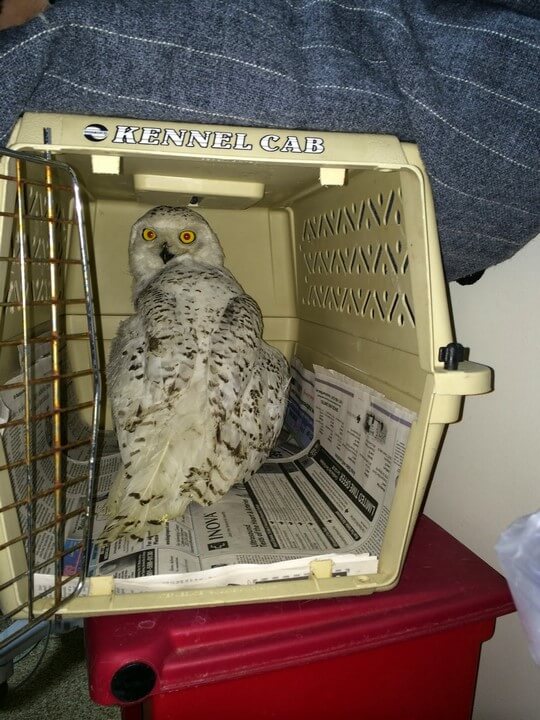 |
| The owl at Friendship waiting for her x-rays |
Wednesday, March 23, 2011
Yappy Hour Success!
| Photos courtesy of James Robertson |
| Frank welcomes one of his supporters |
Thursday, March 10, 2011
Nola's story
Nola was brought in to Friendship for emergency care after a Humane Law Enforcement Officer responded to a call in Northeast DC. A woman had found her curled up on her front porch with severe wounds and smelling of burnt hair. Her whiskers were completely singed off, the tips of her ears were deformed from severe burns and the right side of her body was hairless and covered in an open wound. It was presumed that someone had intentionally set her on fire. What is truly amazing is that despite this horrific act of cruelty she was purring nonstop, wanting only to curl up in someone's arms.
Nola responded very well to treatment and is now safely living with a wonderful foster family while she continues to heal. I am constantly amazed by the ability animals have for unconditional love and forgiveness. It is because of this unending capacity for love that I became a veterinarian and why I believe so strongly in WHS's mission. The animals they protect do not have a voice, therefore it is our moral responsibility to stand up and speak for them.
Watch Nola's story on 9 News Now:
Tuesday, March 8, 2011
Fashion for Paws Update!
A huge thank you to Happy Paws, Friendship, BVNS and all my wonderful clients, Polite Puppies, friends and family whose generous donations have made this possible.
There are still many opportunities if you want to get involved.
Stop by Friendship and enter our raffle for a chance to win:
- Friendship $150 gift card
- Weekend sleepover with play days at Happy Paws
- 6 months of food from Royal Canin
- Gift basket full of Nutramax products
- Canine Wellness gift basket
- Feline Wellness gift basket
Join Friendship and Happy Paws on March 19th for Yappy Hour at Pete's Apizza!
For just $10 guests will take home a Friendship tote bag filled with goodies, a chance to enter the raffle and all the free pizza you can eat. This dog and family friendly event is not to be missed.
Pete's Apizza
March 19th
5-7 pm
4940 Wisconsin Avenue NW
Attend the Fashion for Paws Runway Show
The main event will be held on April 9th at the National Building Museum. Tickets and tables are still available but selling fast so get yours now.
Tuesday, February 22, 2011
Pet obesity in the news
Thursday, February 17, 2011
Washington Post Article vs Client Privacy
Monday, February 7, 2011
Frank on Fox 5 for Fashion for Paws
Thursday, February 3, 2011
Fashion for Paws!
- Join us on March 19th for a Yappy Hour at Pete's Apizza
- Buy a ticket to the event and see Frank strut down the runway in all his glory
- Purchase an ad for your business to be displayed in the official program book
- Stop by Friendship and enter our raffle for the chance to win many great prizes
- Make a direct donation by visiting my fundraising website
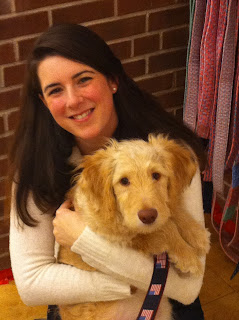 All proceeds from the Fashion for Paws Runway Show directly benefit the more than 30,000 homeless, lost, neglected and abused animals WHS cares for each year. Your donations will also support vital programs such as Humane Law Enforcement, Humane Education, low cost vaccination and spay-neuter programs, Dog Tags and the WHS Behavior and Learning Center.
All proceeds from the Fashion for Paws Runway Show directly benefit the more than 30,000 homeless, lost, neglected and abused animals WHS cares for each year. Your donations will also support vital programs such as Humane Law Enforcement, Humane Education, low cost vaccination and spay-neuter programs, Dog Tags and the WHS Behavior and Learning Center.Tuesday, January 18, 2011
Does sharing the bed also mean sharing diseases with your pet?
The study describes various cases of pet owners contracting horrible diseases like the Plague, MRSA, Cat Scratch Disease and Salmonella. While this information is scary one must also keep in mind that many of these diseases can be avoided with proper veterinary care and good hygiene.
The Plague and Cat Scratch Disease are caused by bacteria that live on fleas; while Lyme Disease and Rocky Mountain Spotted Fever are transmitted by ticks. If you eliminate the fleas and ticks on your pets, you make a big dent in possible exposure. The very best way to accomplish this is with a topical, spot-on treatment such as Frontline or Revolution applied every month.
MRSA is very frightening since it is a bacteria resistant to most antibiotics. The good news here is that pets are very unlikely to cause an initial infections humans. In fact, our dogs and cats should be worrying about what we bring home to them as humans can transmit the bacteria to pets in the house. If you or someone in your home has had a MRSA infection you should be aware that pets can serve as a reservoir and reinfect humans.
The best way to avoid food borne bacteria is not to feed a raw food diet since cooking is the most effective way to rid food of these bacteria. When you feed a raw diet you are potentially introducing Salmonella or E. coli into your home and yard.
The take home message from this study should be that an adult with a healthy immune system, that practices good personal hygiene and provides proper veterinary care for their pet is very unlikely to contract any of these diseases; even if they sleep in bed with their pets.
Thursday, December 9, 2010
Thursday, November 18, 2010
Yappy Hour - Success!
| Photos courtesy of James Robertson |
Thursday, October 7, 2010
It is official, I might be truly crazy

If anyone out there thought I was insane before with all the animals I have please let me solidify this feeling with the announcement of my new puppy -- Frank! I did not seek out a new addition to my already full house but I have been thinking for some time that Poppy would enjoy a larger dog to play with as her version of play with the Lilly, Sparkle and the cats really amounts to torture for them.
Out of the blue a ten week old labradoodle puppy needed a home and I knew he would be the perfect fit for me. I brought Frank home Tuesday night and he and Poppy have not stopped playing since. I have never seen her interact this way with another dog before and it makes me so happy that they have found each other. As for the other animals, the cats really couldn't care less and the little dogs are happy to play with him on their terms. This mean five minutes of play before they get bored and jump up on the sofa to avoid him.
Tuesday, September 7, 2010
Agility!
Happy September! I apologize for my recent lack of posting but I took a little summer vacation from blogging during August. I am very excited to report on my fall project with Poppy – agility class!
Agility is a sport in which you guide your dog over a variety of obstacles while being judged for time and accuracy. It is a great way to strengthen the bond between you and your dog while stimulating them mentally. Many high-energy breeds like border collies and Australian shepherds are much happier when they have a job to do. Running around an agility course expels excess energy while looking to you for commands on where to go challenges them mentally.
Tuesday, July 13, 2010
"How to be Your Dog's Best Friend" at DC's West End Library

I am very excited to be speaking as part of the “How to be Your Dog’s Best Friend” panel at the DC West End Public Library tomorrow evening. I have posted a preview of the topics I plan on covering, each one of these is a vital component of wellness care for your dog.
1. Vaccine recommendations
It is very important to make sure your pets are up to date on their vaccines. I will discuss the vaccines that the American Veterinary Medical Association recommends that all pets receive; these are called core vaccines as well as a few non-core vaccines I think are important.
All pets should be up to date on their rabies vaccines. This is part of the law for good reason, rabies is just about 100% fatal and not protecting your pet against it puts everyone in your family at risk. All dogs should also be vaccinated with a distemper/parvo/hepatitis combination vaccine. This group of infectious diseases can cause gastrointestinal, respiratory and neurologic problems that are often fatal.

So let’s talk about some of the vaccines that people may not know much about. These are not considered to be necessary for every animal but based on lifestyle instead. Leptospirosis is a bacteria transmitted via the urine of an infected animal, most commonly wildlife such as rats, opossums and raccoons. These animals urinate in standing water or moist soil, your dog then comes along and drinks the contaminated water and contracts the disease
Though Lepto can be treated with antibiotics, if the infection is not caught early enough it can permanently damage the kidneys and/or liver, resulting in organ failure. In some cases, the disease is too advanced by the time we catch it and ends up being fatal.
If you are putting your dog in a kennel or taking her to the groomers it is usually required that your dog be vaccinated against “kennel cough”. Kennel cough is a collective term for a highly contagious group of viruses and bacteria that cause irritation in the upper respiratory tract. It is important to realize that the vaccine only protects against the Bordetella bacteria, one of the many infectious agents that can cause “kennel cough”. If your dog is exposed to one of the many other viruses or bacteria that cause upper respiratory symptoms they can still get sick even with the vaccine. In addition even if a vaccinated animal is exposed to the Bordetella bacteria the vaccines does not prevent disease, it will only reduce the severity of clinical signs.
2. The importance of spaying or neutering your pet
I cannot stress this enough. In my opinion, spaying or neutering is the single best thing you can do, not only for your own dog but also for the millions of homeless animals living in shelters. Along with eliminating the chances for many types of cancer developing, spaying and neutering can prevent many behavior issues. I have said it before and I will say it again: female dogs in heat are messy and it is always embarrassing to have your male dog humping someone’s leg.

3. Heartworm and flea/tick prevention once a month every month
Heartworm disease is a parasitic infection transmitted when an infected mosquito bites your dog. While it’s true that infected dogs can be treated, the treatment itself is very dangerous—and can even be fatal. Left untreated, heartworm disease will kill a dog.
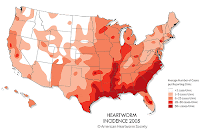
Protecting your dogs against fleas and ticks is important as well. Tick borne infections such as Lyme disease, Erlichia and Rocky Mountain Spotted Fever are transmitted when an infected tick bites your dog. The best way to ward these infections off is with topical flea and tick preventatives like Frontline, Advantix, Revolution, or Advantage Multi. In a temperate climate like ours, these should be applied once a month, every month.
Fleas can be extremely itching and irritating to both you and your pets. Some animals are allergic to fleas and one bite can lead to a significant skin infection. Once a flea infestation invades your home it can be very difficult to clear it out. The best bet is to prevent that from happening by applying the same topical medications that protect against ticks.
Luckily, prevention is easy: just a pill and a topical medication once a month. If only everything were that simple.
4. Avoiding obesity
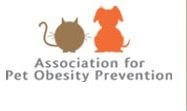
The Association for Pet Obesity Prevention estimates that 42% of dogs and 53% of cats in America are overweight. What’s worse is that an additional 10% of dogs and 19% of cats are considered obese. This means that over 50% of dogs and nearly 75% of cats are at increased risk for diseases that may be preventable. And if that’s not enough to get you motivated, consider this: one study found that dogs kept at a healthy
weight live on average two years longer than their overweight counterparts!
The best strategy for keeping your pet slim is to prevent weight gain in the first place. Never free feed. Instead, always measure out the amount of food you offer your pet. Also try to limit the treats you give to 10% of your pet’s diet. Feeding table scraps is strongly frowned upon. Give too many table scraps and your dog may end up with diarrhea or pancreatitis which can result in a hospital stay. Your pets already love you unconditionally; giving them treats doesn’t make them love you more.

5. Dental disease
Dental disease is one of the most common disorders diagnosed on wellness exams. It is estimated that 80% of dogs and 70% of cats over the age of 3 year old suffer from some degree of periodontal disease.
While a dental cleaning results in whiter teeth and fresh breath, the main benefit is to your pet’s overall health. Consider this: every time your pet chews bacteria is showered into the bloodstream. This then lodges in the kidneys, liver, lungs and heart causing damage and disease. In addition, open fractures, tooth root abscesses and worn teeth are painful and can act as a constant source of discomfort for your pet.
Rather than wait for a problem to develop, it is best to perform a dental cleaning when only mild gingivitis and/or tartar are present. This will maintain good dental health and prevent disease before it becomes a problem, which results in saving you money and more importantly keeping your pet as healthy as possible.
I realize a dental cleaning is not only expensive but it can be scary to put your pet under anesthesia. While anesthesia is daunting, at Friendship we do everything we can to make it as safe as possible with aggressive monitoring while your pet is under anesthesia. At Friendship we are convinced that the low risk of anesthetic complications is far outweighed by the benefits of good dental health. After your dental cleaning we will work with you to keep your pets teeth healthy and prevent tartar buildup. Schedule a dental cleaning and start enjoying those doggie kisses again.
Monday, June 14, 2010
New Interns!
Friendship is one of the few veterinary hospitals in the area qualified to offer an internship program for recent veterinary school graduates. It makes huge contributions to our patient care and to those fortunate veterinarians participating in the program. Internships are highly competitive. Only the most talented and motivated of new graduates seek advanced clinical training. Friendship accepts only about one out of every five applicants to its internship program. We are proud of our program and I consider myself lucky to have completed it.
Unlike medical doctors--who are required to do an internship plus a residency before beginning to practice--most veterinarians enter general practice immediately after graduation and begin practicing medicine. Alternatively, a new graduate can apply for a position in an elective, year-long program of post graduate clinical training, working side-by-side with senior veterinarians with years of experience. These programs are provided by veterinary colleges or busy, multi-doctor hospitals like Friendship.
For the fortunate graduates who are accepted, this is an exciting opportunity to obtain an enormous amount of clinical experience while also being mentored by more senior veterinarians. These programs are completely optional and very demanding. At Friendship, our interns work grueling hours and commit an entire year of their lives so that they can become even better doctors. Some go on to complete residencies in the specialty of their choice, while others, like myself, enter general practice.
From time to time, I have heard pet owners say, "I don't want an intern working on my pet." My response is: Our interns are the best of the new vet school graduates. Not only have they just spent four years learning the latest advances in veterinary medicine from specialists at their respective schools, but they benefit from the fulltime mentoring of Friendship’s highly experienced senior veterinarians.
So let’s give a hand to these doctors for their enthusiasm, dedication to veterinary medicine, willingness to learn from their colleagues, and their desire to be the best veterinarian they can be. To learn more about our current inters please visit the Friendship Hospital for Animals website.
Tuesday, May 4, 2010
Canine Cancer Awareness
 As a pet owner who lost a dog to not one, but three types of cancer--lymphoma, melanoma and hemangiosarcoma--I know firsthand how devastating, confusing and overwhelming this diagnosis can be. The only possible shred of good news is that you have the warm, caring embrace of the Oncology Department at Friendship available to you.
As a pet owner who lost a dog to not one, but three types of cancer--lymphoma, melanoma and hemangiosarcoma--I know firsthand how devastating, confusing and overwhelming this diagnosis can be. The only possible shred of good news is that you have the warm, caring embrace of the Oncology Department at Friendship available to you.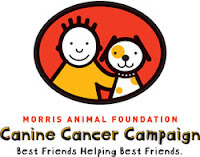
Though most cancers in companion animals are, unfortunately, not yet curable, many are now treatable thanks to devoted doctors like Chand Khanna and organizations like the Morris Animal Foundation. We are making great advances in managing cancer in our beloved pets and one day we will find a cure. I treasured each day I had with Westin and consider myself blessed that she had Dr. Khanna and the oncology service at Friendship looking after her.
Tuesday, April 27, 2010
Polite Puppies!
 The first Polite Puppy class was this past Sunday at Happy Paws and I feel that it was a big success. There was an environment of controlled chaos as puppies leaped and twirled at the end of their leashes trying to play with each other. Once everyone settled down we started by discussing behavior modification (my favorite topic) and that for everything a dog wants in life they must sit and wait for you to offer it to them. We went over how to teach sit, stay and look at me, these are the essential commands that every dog should know. I also encouraged owners to practice restraining their puppies at home which will make the puppy's trip to the hospital much more enjoyable.
The first Polite Puppy class was this past Sunday at Happy Paws and I feel that it was a big success. There was an environment of controlled chaos as puppies leaped and twirled at the end of their leashes trying to play with each other. Once everyone settled down we started by discussing behavior modification (my favorite topic) and that for everything a dog wants in life they must sit and wait for you to offer it to them. We went over how to teach sit, stay and look at me, these are the essential commands that every dog should know. I also encouraged owners to practice restraining their puppies at home which will make the puppy's trip to the hospital much more enjoyable. 
 I touched on nutrition and the importance of feeding one's dog a high quality food appropriate for their dog's lifestyle. What owners need to be aware of is that many of the boutique brands of dog food are formulated to be "all life stage diets" which essentially means it is puppy food. Many people feed these high calorie diets to their couch potato dogs and are confused when they start to gain weight. We also discussed the pros and cons of raw diets and the health risks associated with them
I touched on nutrition and the importance of feeding one's dog a high quality food appropriate for their dog's lifestyle. What owners need to be aware of is that many of the boutique brands of dog food are formulated to be "all life stage diets" which essentially means it is puppy food. Many people feed these high calorie diets to their couch potato dogs and are confused when they start to gain weight. We also discussed the pros and cons of raw diets and the health risks associated with them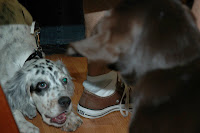 Finally I went over toys I like such as the Kong and how chewing on a tennis ball will ruin your dogs teeth. The puppies were definitely exhausted when they left and I hope the owners took away some helpful tips on keeping their new family members happy and healthy. The next Polite Puppy Class will be Sunday, May 23rd.
Finally I went over toys I like such as the Kong and how chewing on a tennis ball will ruin your dogs teeth. The puppies were definitely exhausted when they left and I hope the owners took away some helpful tips on keeping their new family members happy and healthy. The next Polite Puppy Class will be Sunday, May 23rd.Thursday, April 15, 2010
Allergies affect your pets too!

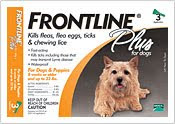
If your dog or cat is itchy you can try giving an omega-3 fatty acid or using a soothing shampoo, if the itching continues make an appointment to speak with your veterinarian about a treatment plan.









